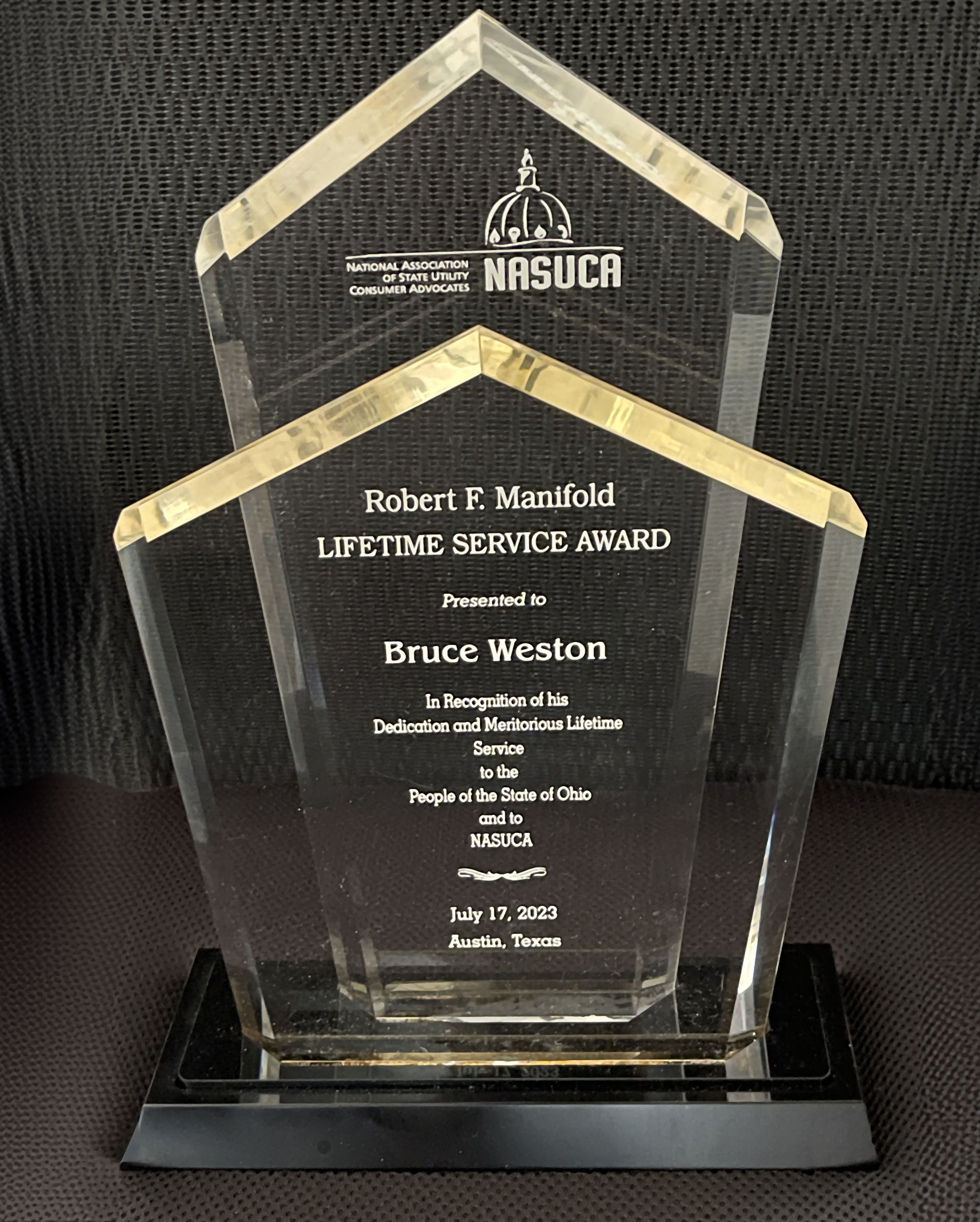The Ohio House of Representatives
Public Utilities Committee
(Requiring Refunds of Improper Charges to Utility Consumers)
By
Jeff Jacobson, Strategic Insight Group
Consumers’ Counsel Weston and I thank you for this opportunity to testify as a proponent of House Bill 260. I am testifying on behalf of the Office of the Ohio Consumers’ Counsel, for Ohio residential utility consumers.
In 2019, the OCC Governing Board passed a resolution seeking regulatory reform, to require refunds of improper utility charges. (It is attached.) House Bill 260 would require refunds to utility consumers when the Supreme Court or other authority determines that the PUCO improperly approved the charges. We thank the bill sponsors for seeking to end this longstanding travesty of justice for Ohioans.
In a 2014 case appealed by OCC and others, the Court held that even though AEP had collected $368 million from consumers in unjustified charges, the law did not allow for customer refunds. Former Justice Lanzinger, writing for the Court’s majority, described the unfairness of the no-refund rule:
AEP collected $368 million in POLR charges during the ESP, without
any evidence that would justify the cost recovery. But under Keco's no-
refund rule, AEP is permitted to keep it, resulting in a windfall for AEP.
(In re Columbus Southern Power Co., 2014-Ohio-462, ¶56.)
And former Justice Pfeifer wrote in dissent that the denial of refunds is “unconscionable.” Justice Pfeifer further remarked that:
In this case, we are talking about $368 million in unjustified charges
that, instead of redounding to the people who paid them, reside in the
coffers of a public utility without the justification of actual costs. This
illusory charge will become pure unwarranted profit based on this
court's decision today. And it does not have to be this way. (In re
Columbus Southern Power Co., 2014-Ohio-462, ¶56.)
We think the Keco case should be overruled or distinguished by the Court, as we have advocated. Sixty years later that hasn’t happened. The PUCO could solve the problem. But it doesn’t. The General Assembly hasn’t acted as the tally of denied consumer refunds climbs into billions of dollars, to the benefit of utilities. We hope House Bill 260 breaks this logjam of consumer rip-offs.
Here is an example of the problem House Bill 260 will solve. The PUCO, after creating a multi-billion dollar subsidy for FirstEnergy in the form of a power purchase agreement, was rebuked by FERC for exceeding its state authority. The PUCO then went searching for a new way to subsidize FirstEnergy, which led to the infamous Distribution Modernization Rider. In a successful appeal by OCC and others, the Court invalidated the charge. It is bad enough that the PUCO writes unlawful rate orders, but that travesty was compounded for consumers. The Court found that the law:
bars any refund of recovered rates unless the tariff applicable to those
rates sets forth a refund mechanism [citations omitted]. FirstEnergy’s
tariffs for the DMR, however, contain no refund mechanism. (In re
Application of Ohio Edison Co., 2019-Ohio-2401, ¶23)
So two million FirstEnergy consumers lost nearly a half-billion dollars in refunds, because the PUCO did not order a refund mechanism. The utility, FirstEnergy, certainly did not seek a refund mechanism for its consumers. But OCC and the Ohio Manufacturers’ Association did seek a FirstEnergy refund mechanism from the PUCO. The PUCO said no. According to the PUCO’s December 21, 2016 ruling, it denied a refund mechanism because "[m]aking Rider DMR subject to refund would be counterproductive and impose additional risks on the Companies." (Order, Case 14-1297, ¶16 (Dec. 21, 2016).) Note that the PUCO did not say in its Order that it couldn’t require a refund mechanism. It just wanted to protect FirstEnergy instead of consumers.
We read in the news that the PUCO expressed a view that its refund authority is very limited. Attached is a May 22, 2021 editorial in the Toledo Blade, that references this PUCO claim. But neither the Supreme Court nor the PUCO stated that view in their recent rulings that we quoted in this testimony. And O.R.C. 4905.32 does not support the PUCO’s view.
The consumer refund problem at the PUCO needs to be viewed in the context of legislative reform for the process of selecting PUCO commissioners. There needs to be balance created, by enacting a requirement for appointing commissioners with a consumer background.
But today you have before you a bill that can solve the injustice by changing the law. We hope you pass it.
At last week’s Committee hearing there was some commentary about proposing a percentage limit on refunds or delaying and limiting refunds to a credit against a future utility rate increase. The proposals could result in consumers receiving less refunds than the amount they were charged (or even no refunds) under a wrongful PUCO order. That result would perpetuate some or all of the current injustice for consumers, to the benefit of utilities. Also, the future netting proposal could lead to utilities claiming it is unconstitutional ratemaking. Please decline such proposals.
It was said that parties already are able to obtain a stay to prevent rates from taking effect, so there is no need for legislation. That claim overlooks the fact that to obtain a stay of a PUCO Order, an appellant must post a bond. (O.R.C. 4903.16.) Utilities have the resources to post a bond, such as when FirstEnergy did so. But OCC and other government or consumer organizations generally cannot afford to post a bond with the Court. An alternative secondary solution (for OCC) could be to change O.R.C. 2505.12 and 4903.16 to clarify that OCC, like other state agencies, would not have to post a bond when it files appeals.
In conclusion, thank you again for your consideration of House Bill 260 and our recommendations. Please pass House Bill 260 for consumer protection.

